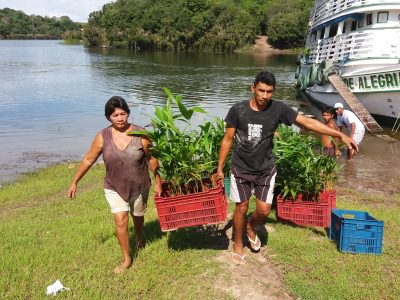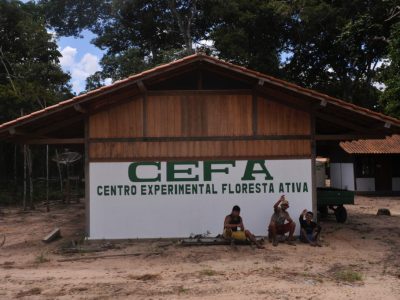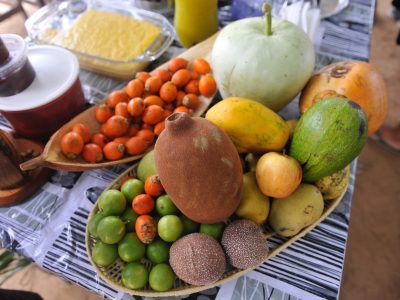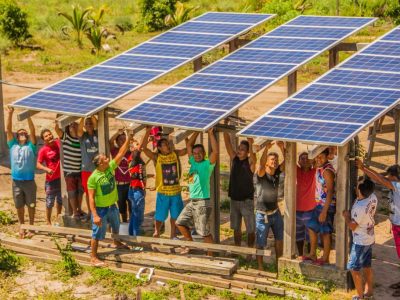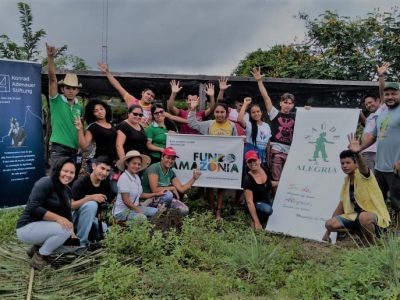Forest economy
Community and Artisanal Tourism
Two activities with g rea economic potential in Western Pará are tourism and artisanal production. PSA’s activity in these two areas aims to value traditional culture, empower the communities and preserve the environment.
PSA’s interdisciplinary actions in hospitality aim to boost community-based tourism, enabling the forest people proactively manage Amazonian tourist activity and execute it in an environmentally correct, economically viable and socially fair manner, disseminating their culture with responsibility. The communities are trained and supported in the creation of visitor and hospitality hubs, with infrastructures that include collective and individual businesses.
The development of socially and economically responsible tourism, integrated into the life of the communities, brings benefits for their other economic activities such as family farming, services (culinary, leisure and tours, for example) and cultural production (crafts, culture, music etc.).
While simultaneously encouraging community-based tourism, PSA executes an artisanal product program based on a revival of traditional techniques that use raw material extracted from the forest in a sustainable way. This in turn supports entrepreneurship, through organizational support, training and structuring of sales and marketing.
Currently, the program implemented by PSA involves approximately 60 female artisans in six community hubs which have been part of the Forest Tourism and Crafts Co-op (TuriArte) since 2015.
Revival of Forest Handicrafts
PSA’s work with artisans from Pará’s traditional communities began with Project “Resgate da Cestaria de Palha de Tucumã e Geração de Renda” (Revival of Tucumã Straw Basketry and Income Generation) in Urucureá. The project was created and implemented in the mid-1990s by Márcia Gama, the artist and social entrepreneur who coordinates the PSA Cabocla Women’s Gender Center.
At the time, artisans from the region of the Arapiuns River, finding it difficult to sell their wares, abandoned the traditional fiber braiding technique. The turned to industrialized dyes and placed less emphasis on creativity of formats. Discouraged, the artisans did not organize themselves with a common strategy that would strengthen the activity and guarantee the quality and visibility of the products.
The project led by Márcia Gama started with a revival of natural pigments used by older artisans. The result was the creation of a collection of high cultural and commercial value, which started to win over new markets. The artisans now had fixed buyers and regular orders, and made their mark at business fairs in Brazil and abroad.
Based on this success, the artisans embarked on a new phase: the formalization of the business and management autonomy. The efforts culminated in the Association of Residents and Rural and Extractive Producers of Urucureá (Asmopreura), created in 2000. This resulted in an increase in basket production but also adaptation to socio-environmental certification standards. PSA earned important recognition in creating a standard model, and won the World Bank’s Citizenship and Innovative Social Initiatives Award in 2002 and the Ashoka-McKinsey National Business Plan Award in 2005.
Since 2008, the model has expanded to other communities, and to an increasing array of handcrafted products.
See also
Agroecology and Repositioning of the Forest
Socioproductive Units
Sociobiodiversity Chains
Renewable Energies
Socioenvironmental Business Incubator
Contact
- Av. Mendonça Furtado, 3979
- +55 93 3067-8000
- +55 93 99143-1091
- psa@saudeealegria.org.br
HOW TO HELP
Projeto Saúde & Alegria © 2020
Agência Fervo

